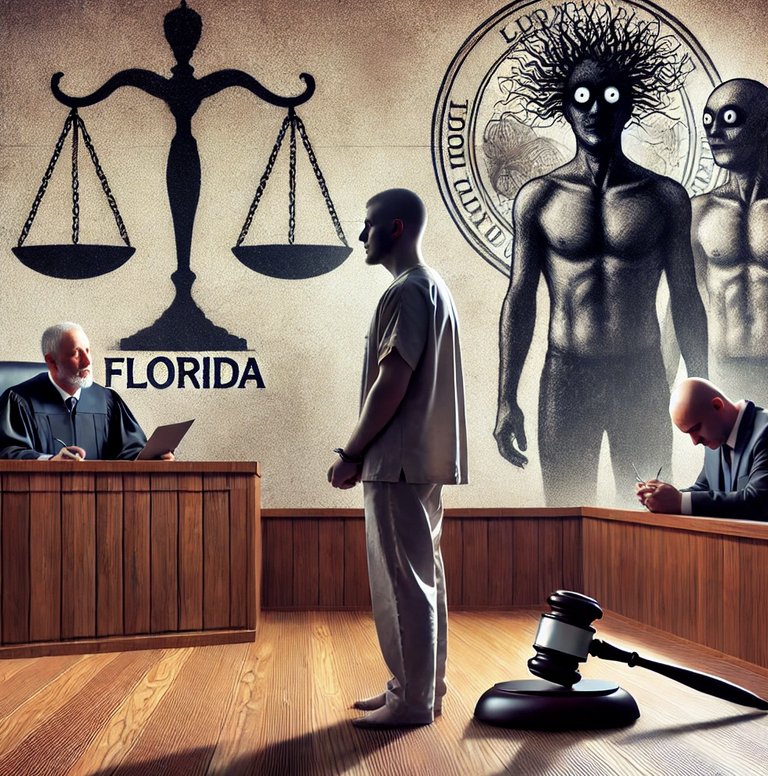The insanity defense is a legal doctrine that allows a defendant to argue that they should not be held criminally responsible (Not Guilty by Reason of Insanity) for their actions due to a severe mental illness or defect. In Florida, as in many other states, the use of the insanity defense is highly scrutinized and subject to specific legal standards. Understanding how the insanity defense operates in Florida requires an exploration of the legal criteria, the process of proving insanity, and the challenges associated with this controversial defense.
Legal Standard for the Insanity Defense in Florida
Florida adheres to the M’Naghten Rule, a legal standard that has been used in the United States since the 19th century. Under the M’Naghten Rule, a defendant may be found not guilty by reason of insanity if, at the time of the offense, they were suffering from a severe mental disease or defect that prevented them from understanding the nature and quality of their actions or from knowing that their actions were wrong.
Specifically, Florida Statute § 775.027 outlines the criteria for an insanity defense:
- Severe Mental Disease or Defect: The defendant must have been suffering from a significant mental illness or impairment at the time of the crime.
- Lack of Understanding: The mental illness must have caused the defendant to either not understand what they were doing or not understand that what they were doing was wrong.
It is important to note that the burden of proof in insanity defense cases in Florida lies with the defense. The defendant must prove their insanity by clear and convincing evidence, a standard that is more demanding than the “preponderance of the evidence” standard used in many civil cases but less stringent than “beyond a reasonable doubt.”
The Process of Raising the Insanity Defense
When a defendant wishes to raise an insanity defense in Florida, several procedural steps must be followed:
- Notice of Intent: The defense must provide the prosecution with a formal notice of intent to raise an insanity defense. This notice must be given well in advance of the trial, allowing the prosecution time to prepare its response.
- Psychiatric Evaluation: The court will typically order one or more psychiatric evaluations to assess the defendant’s mental state at the time of the offense if the defendant is indigent. Both the defense and the prosecution may retain their own experts to conduct evaluations and may present expert witnesses, such as psychologists or psychiatrists, who will testify about the defendant’s mental condition and offer an expert opinion.
- Trial: During the trial, the defense must present evidence supporting the claim of insanity. This often includes testimony from mental health experts, medical records, and other relevant documentation. The prosecution will counter with its own evidence, seeking to prove that the defendant was sane at the time of the crime.
- Jury Decision: Ultimately, the jury must decide whether the defendant has met the burden of proving insanity. If the jury finds the defendant not guilty by reason of insanity, the defendant is not simply set free. Instead, they are typically committed to a mental health facility for treatment until they are deemed no longer a danger to themselves or others.
Challenges and Controversies Surrounding the Insanity Defense
The insanity defense is one of the most controversial aspects of criminal law, and its application in Florida is no exception. There are several challenges and issues that arise when dealing with the insanity defense:
- Public Perception and Misconceptions:
- The insanity defense is often misunderstood by the public. Many people believe that it is a “loophole” that allows dangerous criminals to escape justice. In reality, the insanity defense is rarely used and even more rarely successful. The perception that defendants can easily manipulate the system by claiming insanity is not supported by statistical evidence.
- Proving Insanity:
- Meeting the burden of proof for insanity, and actually convincing a jury to go along with it, is notoriously difficult. The defense must provide clear and convincing evidence that the defendant was suffering from a severe mental illness and that this illness prevented them from understanding their actions. This often involves complex psychiatric testimony, which can be challenging for juries to interpret.
- M’Naghten Rule Limitations:
- Some critics argue that the M’Naghten Rule is outdated and fails to account for the complexities of modern psychological understanding. For example, the rule focuses on cognitive awareness (i.e., understanding right from wrong) but does not adequately consider other factors, such as a defendant’s ability to control their actions due to compulsion or delusion.
- Post-Trial Consequences:
- If a defendant is found not guilty by reason of insanity, they are typically committed to a state mental institution. However, there is often public concern about how long such individuals remain in treatment and when they may be released. The decision to release a person who has been committed after an insanity defense can be contentious, particularly if there is concern about the individual’s potential danger to society.
Notable Cases and Legal Developments in Florida
Florida has seen several high-profile cases where the insanity defense played a central role. These cases often attract significant media attention and spark public debate about the appropriateness and effectiveness of the insanity defense. In recent years, there has been ongoing discussion about potential reforms to the insanity defense in Florida. Some legal experts advocate for a more nuanced approach that would take into account a broader range of mental health issues. Others argue for stricter standards to ensure that only those truly incapable of understanding their actions can successfully claim insanity.
The Case of Andrea Yates (2001)
- Overview: Andrea Yates, though not originally from Florida, her case was a landmark in the discussion of the insanity defense. Yates was a Texas woman who drowned her five children in a bathtub in 2001. Her defense argued that she was suffering from severe postpartum depression, postpartum psychosis, and schizophrenia at the time of the killings.
- Legal Outcome: Although the case was tried in Texas, it had significant implications for similar cases across the country, including in Florida. The jury initially found Yates guilty of murder and sentenced her to life in prison. However, this verdict was later overturned on appeal, and in a subsequent trial, she was found not guilty by reason of insanity and committed to a mental hospital.
- Significance in Florida: The case influenced public and legal perspectives on the insanity defense in Florida, especially in cases involving severe mental illness.
The Case of John Hinckley Jr. (1981)
- Overview: John Hinckley Jr. attempted to assassinate President Ronald Reagan in 1981 to impress actress Jodie Foster. Although this case did not occur in Florida, its impact was felt nationwide, including in Florida, as it led to a national reevaluation of the insanity defense.
- Legal Outcome: Hinckley was found not guilty by reason of insanity and was committed to a psychiatric facility. The public outcry following this verdict led to significant changes in the way the insanity defense is perceived and applied in many states, including Florida, prompting stricter standards and procedures.
- Significance in Florida: The case had a profound effect on Florida’s legal landscape, leading to a more stringent approach to the insanity defense, including the burden of proof placed on the defendant.
The Case of Aileen Wuornos (1992)
- Overview: Aileen Wuornos was a Florida prostitute who killed seven men in 1989-1990. She claimed that the men had either raped or attempted to rape her while she was working as a prostitute, and that all of the homicides were committed in self-defense. During her trial, her defense team argued that she was mentally unstable and suffering from borderline personality disorder.
- Legal Outcome: Despite the insanity defense, Wuornos was convicted of multiple counts of murder and sentenced to death. She was executed in 2002. Her case remains one of the most infamous examples of a failed insanity defense in Florida.
- Significance in Florida: The Wuornos case highlighted the difficulties of proving insanity in Florida, particularly in cases involving multiple homicides and where the defendant’s mental state was in question but not deemed sufficient to meet the legal criteria for insanity.
These cases demonstrate the complexities and challenges of using the insanity defense in Florida, where the burden of proof is high and public perception can heavily influence the outcome. The insanity defense in Florida is a complex and challenging legal doctrine that raises important questions about mental illness, criminal responsibility, and justice. While it serves as a necessary safeguard for individuals who cannot be held fully accountable for their actions due to severe mental illness, it also presents significant challenges for the legal system. Understanding the legal standards, processes, and controversies surrounding the insanity defense is crucial for ensuring that it is applied fairly and effectively in the pursuit of justice.








